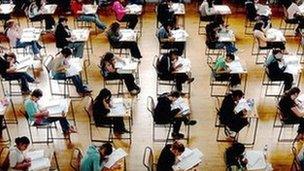GCSE overhaul in England made final by Ofqual
- Published

Many changes are planned and under way for England's exam system
Will a 9 be the new A*? Ofqual's Glenys Stacey explains the changes
Exams regulator Ofqual has confirmed the changes it is making to GCSEs, in what it calls the biggest shake-up of exams in England for a generation.
A new grading system will use numbers instead of letters, and coursework is being scrapped for most subjects.
The changes will be in stages, starting with pupils due to take GCSE exams in 2017. Those who turn 13 in this academic year will be the first.
English and maths will be the first subjects affected.
Pupils will begin studying the new courses in English language, English literature and maths from the autumn of 2015.
And about 20 other popular GCSE subjects will be revamped in the same way, ready for teaching a year later, in 2016, with the first exams for those taken in 2018.
'Fresh content'
The changes apply to England only. Wales is planning its own GCSE shake-up, but Northern Ireland is not planning any changes. Scotland has its own exams system.
While they come in, pupils in England will have some exams graded with numbers and some with letters, leading teaching unions to warn this will be confusing for pupils, parents and employers.
Exams will be graded from 1 to 9, with 9 being the highest. Pupils who fail will be awarded a "U" for an unclassified result.
All exams will be taken after two years of study, rather than in modules taken at various stages over two years, meaning a return to the format of O-levels, which pre-dated GCSEs.
And there will be more marks awarded for spelling, punctuation and grammar.
The head of Ofqual, Glenys Stacey, said the changes were "fundamental".
"This is the biggest change in a generation," she said. "They [GCSEs] have been around for over 25 years but now we are seeing fresh content, a different structure, high-quality assessment coming in.
"It's a significant change for students and for schools."
Ms Stacey said the move to a numerical system meant a new grade was being added and that would help examiners distinguish between candidates' performance - especially at the top grades.
She suggested that the move away from traditional grades might be hard for some people to understand, but was important.
"The new qualifications will be significantly different and we need to signal this clearly," she said.
At the same time, the government is confirming changes to what has to be studied in English language, English literature and maths, because the overhaul of exams covers both what is studied and how it is assessed.
It says in English literature, external, students will have to "study whole texts in detail, covering a range of literature including Shakespeare, 19th Century novels, Romantic poetry and other high-quality fiction and drama".
The new maths exam will cover more topics and will be more challenging, the government says. Details, external were released on Friday morning.
For maths, Ofqual is keeping the present arrangement where pupils can be entered for either a higher- or lower-tier paper in maths, depending on their ability.
But in English, that division has been scrapped and one exam will be taken by all.
At the moment, students who are entered for easier papers can be awarded only the maximum of a C grade.
Pupils from Liverpool give their reaction to the changes
The government says young people were let down by the old exam system; that frequent testing meant not enough time was spent on "deep learning" and not enough attention was paid to grammar, spelling and punctuation.
Schools Minister Elizabeth Truss says the changes will improve students' "core skills" in maths and English and raise expectations.
"What we want to do is encourage schools to focus on those core skills that employers really want, because that is what is going to help our children get jobs when they leave school," she said.
'Cautious welcome'
Headteachers' representative, the Association of School and College Leaders (ASCL), gave what it said was a "cautious welcome" to the changes.
Deputy general secretary Malcolm Trobe said: "There is much to welcome in today's announcement, especially the measured approach Ofqual has taken to this significant task.
"We have always agreed that GCSE can be improved to better prepare students to meet the needs of the world we live in today. But the constant tinkering with GCSEs we have had in the past has not been helpful."
Unions representing classroom teachers warned that a shift away from coursework and having different levels of exams for different abilities could damage some pupils' education.
Secondary school teacher and spokesman for the Association of Teachers and Lecturers, Jovan Trkulja, said that less able students could suffer.
"Exams are challenging and they should continue to be challenging. But we have to remember that setting the top of the mountain as the baseline means someone has to fall behind, and I feel for the sense of failure for the less able," he said.
Shadow schools minister, Labour MP Kevin Brennan, said he had "reservations" about some aspects of the changes and that the move towards a numbered grading system was a step back to the 1970s.
He said he agreed that the pendulum "might have swung a little too far on coursework", but there was now a danger that "it will swing too far the other way".
"Having everything staked on one final exam is not great for all pupils," he said.
- Published11 June 2013
- Published19 September 2013
- Published29 September 2013
- Published6 September 2013
- Published8 February 2013
- Published25 October 2013
- Published21 May 2013
- Published22 August 2013
- Published2 October 2013
- Published20 September 2013